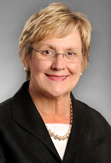The chairwoman of a key House health panel has gone on record as saying that Georgia’s largest health insurer is acting as a “bully’’ in its dealings with medical providers.
State Rep. Sharon Cooper (R-Marietta) also said Blue Cross and Blue Shield of Georgia “disrespected” the House Health and Human Services Committee by failing to send a representative to the panel’s meeting Monday, which discussed complaints against the insurer.
The comments were part of an intense hearing at the state Capitol on the insurer’s actions in the Georgia market. Blue Cross is by far the biggest health insurer in Georgia.
“I have never heard this many complaints [from medical providers] in terms of getting contracts,’’ Cooper said at the panel meeting.
The health committee also passed a bill that would establish safety requirements when a patient is switched to a special “interchangeable biological” drug. These medications are not yet on the market, but could provide cost savings to consumers in the future.
But Cooper and other lawmakers focused most of their energy on Blue Cross.
The insurer and Grady Health System in Atlanta have been at an impasse over a contract that lapsed late last year. Now Grady Memorial Hospital is “out of network’’ for Blue Cross health plan members, who face higher out-of-pocket costs at the Atlanta facility.
“We are not being paid fairly’’ by Blue Cross, Mark Meyer, Grady chief financial officer, told the House panel. It’s the same message that Grady has emphasized in its media campaign criticizing the insurer’s position.
Blue Cross has said it has paid Grady no differently than any large urban hospital in Georgia.
Reached by GHN for comment Tuesday on Cooper’s comments, Blue Cross spokeswoman Debbie Diamond said in an email statement, “Blue Cross and Blue Shield of Georgia is committed to keeping the lines of communication open with members of the legislature.
“We made a personal visit to Rep. Cooper’s district last week to discuss the issue and made it clear we are happy to meet with her and interested members, but that we simply cannot discuss private hospital-insurer contract issues in a public setting. We appreciate Rep. Cooper’s interest in health care matters and all she has done as chair of the committee.”
Cooper also noted Monday that Blue Cross was the sole health insurer last year for the state’s largest health plan, which covers more than 600,000 state employees, teachers, other school personnel, retirees and dependents.
This year, other insurers are included in the State Health Benefit Plan (SHBP), but a large majority of members continue to be covered by Blue Cross.
Clyde Reese, commissioner of the Department of Community Health, told the panel Monday that the SHBP was “in dire financial straits” when Blue Cross presented a plan for savings for the 2014 plan year.
“I truly believe in competition, as a Republican,’’ Cooper told Reese. “They’re being bullies. We need some competition here.” She expressed concern about the financial viability of rural providers.
Cooper said angrily that Blue Cross officials “did not have enough guts’’ to attend the panel meeting.
Representatives of Northeast Georgia Health System and the Medical Association of Georgia (MAG) also testified about the difficulties in reaching agreements with Blue Cross.
Donald Palmisano, the MAG executive director, noted that last year state Insurance Commissioner Ralph Hudgens told Blue Cross to rescind newly added amendments to contracts with thousands of physicians.
While Blue Cross was not present at the meeting, the leader of a Georgia health insurer trade group told lawmakers Monday that health plans “are absolutely committed to providing access and affordable health care to Georgians.”
The other hospital not in network with Blue Cross is Polk Medical Center in Cedartown. Its administrator, Matt Gorman, told the House panel Monday that because of the hospital’s non-network status with Blue Cross, families are forced to drive outside the community to get care, or pay more to go to Polk Medical.
“Our patients are the ones paying the price,” Gorman said.
State Rep. Trey Kelley (R-Cedartown) said people in his community “are forced to drive miles down the road” to get hospital services.
“My parents are teachers,” Kelley said. “They can’t go to their local hospital.”
Meanwhile, Graham Thompson, of the Georgia Association of Health Plans, noted the news of a possible merger of Emory Healthcare and WellStar Health System in metro Atlanta. He said hospital-based systems, as they grow huge and gain clout through such consolidation, “can bully people around, too.”


